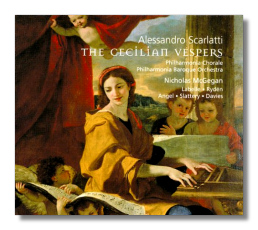
The Internet's Premier Classical Music Source
Related Links
- A. Scarlatti Reviews
- Latest Reviews
- More Reviews
-
By Composer
-
Collections
DVD & Blu-ray
Books
Concert Reviews
Articles/Interviews
Software
Audio
Search Amazon
Recommended Links
Site News
 SACD Review
SACD Review
Alessandro Scarlatti

The Cecilian Vespers
- Nisi Dominus aedificaverit
- Salve Regina
- Audi filia, et inclina aurem
Susanne Rydén, Dominique Labelle, sopranos
Ryland Angel, countertenor
Michael Slattery, tenor
Neal Davies, baritone and cantor
Philharmonia Chorale
Philharmonia Baroque Orchestra/Nicholas McGegan
Avie 0048 DDD 2 Hybrid SACDs: 64:21, 66:20
Cecilia is the patron saint of music, of course, and so it is only natural to honor her musically. At the behest of Rome's Cardinal Francesco Acquaviva d'Aragona, Alessandro Scarlatti did so, writing several short works in 1720 for one vespers service, and several more in 1721 for another. Musicologists have been aware of the component works for a long time, but it was only in 1965 that the pieces were reassembled to form a complete service. The Cecilian Vespers are comprised of five psalm settings ("Dixit Dominus," "Laudate pueri," "Laetatus sum," Nisi Dominus," and "Lauda, Jerusalem") with their accompanying antiphons. The Vespers end with a hymn ("Jesu, corona") and a Magnificat, because vespers for female saints mirror those used to praise the Virgin Mary. This new recording presents the entire Cecilian Vespers as they might have been heard in November 1721. To round out this pair of CDs, McGegan has added a more extended setting of the Nisi Dominus, a Salve Regina, and Audi, filia, which is a gradual for St. Cecilia's Day.
Scarlatti's period of activity overlapped Vivaldi's, but Scarlatti was the older of the two, and his music clearly influenced the younger composer. A true Italian, Scarlatti apparently was incapable of writing anything lacking in grace or mellifluousness, and his vocal music – including dozens and dozens of operas – is considered to be particularly attractive. Having said that, one must also say that it is not grippingly dramatic. In the "Dixit Dominus," the Latin text refers to how the Lord shall "crush the heads in the land of the many" - shades of Kids in the Hall! Scarlatti responds to the threat thus expressed with music that can best be described as jaunty. I doubt anyone who listens to the Cecilian Vespers is looking for a heaven-storming experience, however. It is better just to sit back and let its yards and yards of deliciousness waft over you.
This recording is based on performances that occurred in April 2004 at the First Congregational Church in Berkeley, California – applause (at least some of it) has been left in. (The Audi, filia was added a few days later.) McGegan is an established master in the Baroque repertoire, and he leads his forces in a performance which is polished and stylistically accurate. Even when the music is at its most serious, McGegan allows it to dance. There are 20 voices – five to a part – in the Philharmonia Chorale, and the orchestra is about the same size. (It can lose or gain players depending on the individual work.) Each soloist gets his or her opportunity to shine. Ryland Angel, the aptly named countertenor, blends most seductively with Gonzalo Ruiz's oboe in the antiphon "Valerianus in cubiculo," which serves as an introduction to "Laetatus sum."
A thick accompanying booklet contains a wealth of information. The engineering on this Super Audio CD moves the solo voices quite far forward, but it is admirably clear. In quiet moments one can hear what might be the First Congregational Church's cooling system (it's either that or the breathing of the organ!) but it is not distracting.
Copyright © 2005, Raymond Tuttle




















